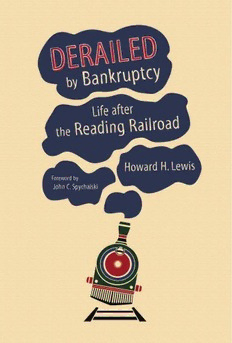
Derailed by Bankruptcy: Life after the Reading Railroad PDF
Preview Derailed by Bankruptcy: Life after the Reading Railroad
Railroads Past and Present George M. Smerk and H. Roger Grant, editors A list of books in the series appears at the end of this volume. This book is a publication of Manufactured in the United States of America Indiana University Press Office of Scholarly Publishing Library of Congress Herman B Wells Library 350 Cataloging-in-Publication Data 1320 East 10th Street Bloomington, Indiana 47405 USA Lewis, Howard H., [date] Derailed by bankruptcy : life after the iupress.indiana.edu Reading Railroad / Howard H. Lewis. pages cm. — (Railroads © 2015 by Howard H. Lewis past and present) All rights reserved Includes bibliographical references ISBN 978-0-253-01866-3 (cl : alk. paper) No part of this book may be reproduced — ISBN 978-0-253-01871-7 (eb) 1. Reading or utilized in any form or by any means, Company. 2. Railroads—United States— electronic or mechanical, including Finance. 3. Railroads—United States photocopying and recording, or by any —Management. 4. Bankruptcy—United information storage and retrieval system, States. 5. Railroads and state—United without permission in writing from the States. I. Title. publisher. The Association of American HE2791.R27 L49 2016 University Presses’ Resolution on 385.06'57481—dc23 Permissions constitutes the only excep- 2015014883 tion to this prohibition. The paper used in this publication meets the minimum requirements of the American National Standard for Information Sciences–Permanence of Paper for Printed Library Materials, ANSI Z39.48–1992. 1 2 3 4 5 20 19 18 17 16 15 To my family, my wife and children who bore with me while I did the work which is the subject of this book. CON T EN T S · Foreword by John C. Spychalski ix · List of Abbreviations xiii · List of Important Names xv · Introduction 1 1 The Age of Innocence 4 2 The Gathering Storm 18 3 A Time of Waiting 27 4 The Beginning 31 5 The Plot Thickens 42 6 Fear and Exhaustion 60 7 Detailed Case Preparation 68 8 The Times That Try Men’s Souls 77 9 The Rail Use Case: Ours and the Government’s 85 10 The Government’s Case 94 11 End Game 101 · Epilogue 123 · Notes 133 FORE WORD Financial failure enveloped most of the rail network in the northeastern United States and adjacent territory during the first half of the 1970s. By 1973, seven companies operating a total of 25,160 route miles of line in this area were conducting business under bankruptcy law protection. Historically, most railroads that suffered bankruptcy were returned to solvency by so-called income-based reorganizations that reduced the claims of security holders to levels that could be sustained by existing and estimated future levels of revenue. However, the situation in 1973 was different. By then it had become apparent that the existing and fore- seeable earnings of most if not all of the seven bankrupt companies had fallen too low to support a reorganized structure of debt and equity se- curities of any magnitude. Consequently, liquidation of the companies’ assets and termination of most of the rail service in the Northeast be- came a real threat, thus posing the specter of serious collateral negative economic consequences, locally, regionally, and nationally. This grim scene sets the stage for attorney Howard H. Lewis’s au- tobiographical portrayal of his involvement with the bankruptcy pro- ceedings of the Reading Company.1 As operator of 1,149 route miles of line comprising 4.5 percent of the aforementioned total of 25,160 miles, the Reading ranked third in size among its bankrupt counterparts. Al- though dwarfed by the 19,300-mile Penn Central Transportation Com- pany, largest of the bankrupt carriers, the Reading served customers for ix
